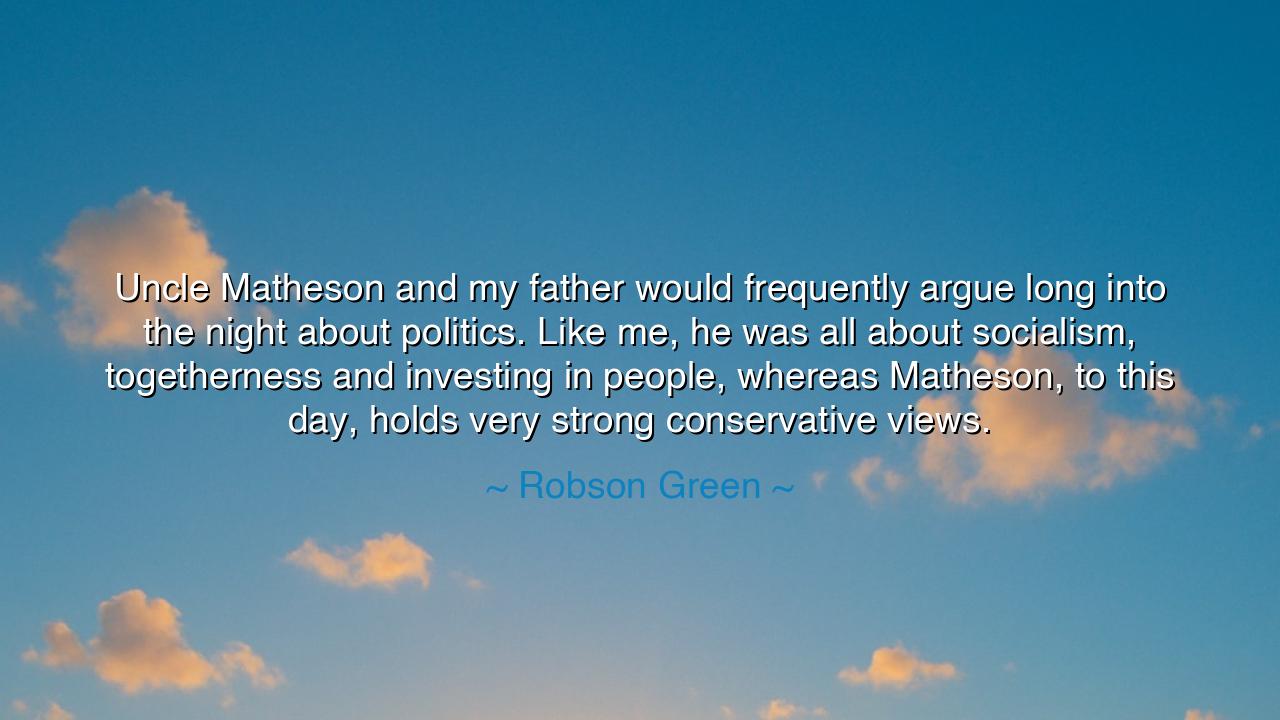
Uncle Matheson and my father would frequently argue long into
Uncle Matheson and my father would frequently argue long into the night about politics. Like me, he was all about socialism, togetherness and investing in people, whereas Matheson, to this day, holds very strong conservative views.






Hear, O children of remembrance, the heartfelt words of Robson Green: “Uncle Matheson and my father would frequently argue long into the night about politics. Like me, he was all about socialism, togetherness and investing in people, whereas Matheson, to this day, holds very strong conservative views.” In these lines we see not merely a family quarrel, but the eternal contest of ideas, the clash between visions of society—socialism and conservatism—debated not in parliaments alone, but at the hearth of ordinary homes.
For politics is not distant from the lives of men; it is woven into their tables, their friendships, and their kinship. Here, the father stands for togetherness and investing in people, believing that strength comes from the community lifting one another. The uncle, Matheson, embodies the fierce defense of tradition, order, and the preservation of individual responsibility. Neither is evil; each sees a different path toward the flourishing of life. Their nightly debates are a microcosm of the world itself, a reminder that the greatest struggles of society often live within the same bloodline.
History has echoed this same battle. In the founding of America, brothers and neighbors were divided between loyalists to the crown and revolutionaries for independence. Families split, friendships fractured, yet each side believed they fought for the survival of what was good. So too in Green’s memory: the father and uncle, bound by love of kin, are separated by their vision of how society must endure. The table becomes their battlefield, yet affection remains their truce.
The deeper wisdom of these words lies in the endurance of debate itself. That family can argue long into the night and yet remain family teaches us that disagreement need not destroy bonds. In an age where division grows bitter and unyielding, their example is a reminder that love can hold even when ideas clash. Indeed, it is only within such bonds that true dialogue thrives, for when respect remains, truth may emerge.
Therefore, O children of tomorrow, take heed: the conflict of socialism and conservatism, of progress and tradition, is as old as civilization. Yet such struggles are not curses, but the very fire that refines a people. Debate with passion, but remember always the bond of humanity beneath. For the test of a nation, as of a family, is not whether it argues, but whether it endures together when the argument is done.






GDGold D.dragon
The political differences between Green’s father and Uncle Matheson reflect a deeper issue that many face: how do we maintain family ties when political divisions run deep? Are the values of socialism and conservatism so fundamentally opposed that meaningful compromise is impossible? How can families overcome these divides and focus on shared goals or values, despite their political differences? Is it worth trying to change someone’s mind on such deeply rooted issues?
UGUser Google
Green’s recollection of his father’s socialist beliefs versus Matheson’s conservative stance highlights the generational and ideological divides that can exist within families. Is it possible for these debates to be productive, or do they simply create tension? How can people with different political ideologies learn from each other, especially when they come from the same family? Can mutual respect for each other’s beliefs lead to constructive discussions?
LHTran Le Hoang
The ongoing political arguments between Green’s father and Uncle Matheson reflect how deeply personal politics can be, even when it comes to family. How often do political ideologies lead to polarized perspectives that are hard to reconcile? Are there ways for individuals to evolve their beliefs or shift their stance without alienating family members who have different values? What role does empathy play in these conversations?
NLNhan Le
Robson Green’s mention of long political debates between his father and Uncle Matheson highlights how personal values shape one’s political views. How can two people who are so committed to opposing ideologies still respect each other? Do these debates, even if heated, contribute to better understanding, or do they reinforce divisions? Is there a way to find common ground despite stark political differences?
ANLan Anh Nguyen
The contrast between Green’s belief in socialism and his Uncle Matheson’s strong conservative views is a microcosm of broader societal divisions. How do political disagreements affect family dynamics? When individuals with such differing ideologies come together, is it possible to have a healthy debate, or do these discussions inevitably lead to tension? How can families maintain unity when politics seem to permeate every conversation?